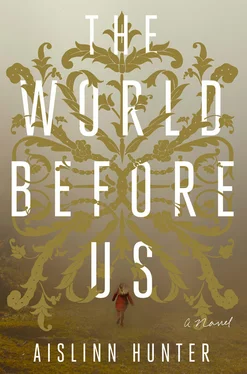Aislinn Hunter
The World Before Us
The number of lives that enter our own is incalculable.
— JOHN BERGER
Our dead are never dead to us, until we have forgotten them.
— GEORGE ELIOT
It awes me when I think of it, that there was a time when you and I were not … But now there can never come a time when you and I shall not be.
— ANNA ROBERTSON BROWN
I can only say, there we have been: but I cannot say where.
And I cannot say, how long, for that is to place it in time.
— T.S. ELIOT
How many ways to begin?
Near infinite.
Don’t ask us what we think, none of us agree on anything. Start with the woods, says one. Start with the sky, says another, with the birds falling out of it, their bodies sent like arrows to the earth. No, begin with the great lawns and the peacocks and the sound the males’ tail feathers make in their unfolding. Start with a kiss, with the teacup and its curl of painted ivy. Start with the afternoon the sky ripped open and a month’s worth of rain poured through the gap — the whole city lifting trouser and skirt hems.
Start with Jane, says one, it’s where we always begin — crowded around her bed watching the clock blink toward morning. Start with Jane because our stories are tied to hers and everything depends on what she does with them. But it is early, only four a.m., and Jane is sleeping, the curtains billowing out from the window, the moon tucked behind the clouds.
So start with the door she is dreaming about — its slant and chance opening. Yes, the door: what slips through, what goes missing.
The Whitmore Hospital for Convalescent Lunatics sat along a carriage track most people travelled only once. Imagine late summer: sunlight splayed over the rutted road and the copper peaks of the buildings, its warmth nested in the crowns of the trees and sinking into the bright-green lawn of the viewing mound. Because the inclement weather of the past month had finally ceased, the Matron was organizing a picnic. The patients, lined up inside the galleries, pressed their faces to the windows and watched as she marched past the fountain in a trim black dress, two attendants with wicker baskets walking smartly behind her. The inmates Leeson and Herschel were in the gallery of the men’s ward nearest the door. The girl was inside the women’s gallery, at the front of the shuffling crowd, her attention on the attendant who was unfurling a cut of cloth over by the rose bushes, how the sheet lolled briefly on a pocket of air before being snapped into place on the asylum grounds.
It was the 2nd of August 1877. We know this because Jane has read accounts of the day and we have stood over her shoulder and read alongside her. One hundred and six souls were in residence that summer, most in the main wards, five or so in refractory care. We know that two of the attendants were off work with fever and that the Superintendent was in the city applying for a permit to extend the farmyard so as to better accommodate the new litter of pigs. A litter that Sir Thom, the hospital tabby, was attempting to avoid by slinking along the stone wall at the edge of the property.
Leeson and Herschel studied the cat from the men’s ward window — a distant spot of ginger against the press of the woods. By the time the matron’s attendants had brought out the next round of hampers, the animal’s progress had been stalled by a cleft in the stone wall, a V-shaped opening that Sir Thom surveyed briefly, and then leapt into. Leeson turned to Herschel just as a whiff of fresh air, of drying earth and dilly grass, gusted into the corridor. Surprised, the two men looked to its source: a gap between the ward door and its frame.
What happened next set everything in motion: Herschel opened the old matchboard door — opened it as if he were allowed, as if he were back home on his farm in P — on an ordinary morning, lifting his own door latch and unceremoniously starting out. The other inmates watched him turn onto the path that led to the gatehouse, the big man in full stride, his grey painting smock giving his form a ghostly shapelessness, his legs bare and hairy down to his boots.
The attendants on duty did not notice Herschel. Two of them had gone back inside to fetch hampers from the kitchen and the third, a lanky blond, was lingering near the door to the laundry flirting with the sisters who worked there. The Matron was alone on the grounds, kneeling by the fountain, smoothing out the large staff blanket and setting out the silver. When she finished she sat up, and Herschel, registering her broad back and the whorl of her red hair, veered away, moving steadily toward the wrought-iron gates. By the time he was pottering toward the woods and the collapsed section of the stone wall, she was folding the table napkins.
A flurry of cheers went up in the men’s gallery when he made it to the stone wall. The other patients watched as the farmer lifted one leg and then the other over the rubble at the base of the cleft. For a split second Herschel seemed to waver there and then whoosh , he was gone, his whole frame swallowed by the trees.
Leeson blinked, trying to make sense of what he’d seen, worried that a hole or pit had been dug at the edge of the woods and that Herschel had lumbered into it. He pressed his hand against the glass, unsure of what to do, though he felt he ought to do something. From behind him came the sound of scuffling feet; he could hear Wick begin to titter. Feigning indifference, he studied the slot between the door and its support, the bare patch of stone floor that, minutes ago, had held conference with his friend. He hesitated a second, then dropped his hand onto the door handle. This agitated the men in the ward corridor further. Greevy, his grey hair wild, came forward to waggle a finger in front of Leeson’s face, and with that gesture the newest inmate, Hopper, started on the window, his forehead bump, bump, bump ing against the glass — a rhythm that inspired the musician to clap his hands, which in turn roused the poet.
“A Brisk Composition in Honour of the Occasion!” the poet shouted, and Hopper stopped. The commotion subsided. “Unchain me!” the poet began, his voice filling the length of the gallery. “Unchain me, unchain me, lest the hour’s dark horses come.”
Slowly, so as not to set the group off again, Leeson inched the door open. A slat of sunlight fell onto the floor at his feet, brighter and more concentrated than what filtered through the quarrelled windows. He stared at it as if it were an accident, wondered if perhaps it had spilled out of a box, one that he had been entrusted with, one bearing a gift not intended for him. He waited to be called out and chastised, but nothing happened and no one came, and thinking only of Herschel, who might himself be in peril, Leeson stepped across the mat of honeyed light and scuttled out the door.
By the time he neared the fountain he was moving at a decent pace — just ahead of him were the Matron, the gatehouse and the belt of trees that Herschel had slipped into. Wisely, he gave the Matron a wide berth, treading as lightly as he could over the grass. Just as he moved past her, she straightened her back and turned toward the ward windows, a bowl of boiled eggs in her hand. Two dozen faces stared out at her, pale as dinner plates. Amused, she tsk-tsk ed under her breath and set the bowl back in the place she’d just moved it from.
Where Noble, the hall porter, had gone off to remains a matter of debate. He was still on poor terms with the Superintendent for falling asleep on watch and for glomming about near the windows while the female patients were jarring preserves in the kitchen. The asylum logbook for the 2nd of August states only that the event occurred around noon and that Noble saw nothing. The patients, once they were let out for lunch, did not raise the alarm, although a few of them, Hopper in particular, refused to settle down on a blanket, which prevented the head count from being taken for some time.
Читать дальше












